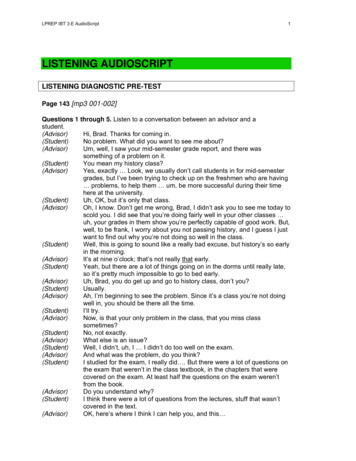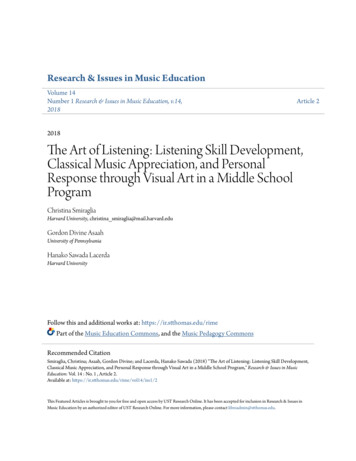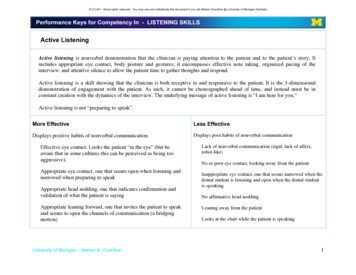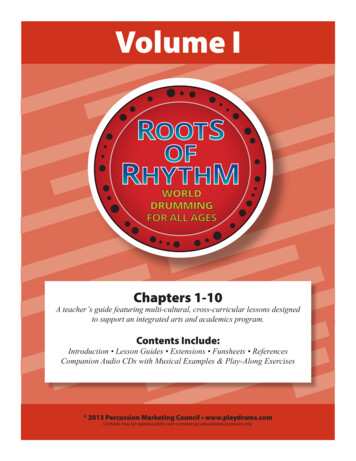
Transcription
LPREP IBT 3 E AudioScript1LISTENING AUDIOSCRIPTLISTENING DIAGNOSTIC PRE-TESTPage 143 [mp3 001-002]Questions 1 through 5. Listen to a conversation between an advisor and astudent.(Advisor)Hi, Brad. Thanks for coming in.(Student)No problem. What did you want to see me about?(Advisor)Um, well, I saw your mid-semester grade report, and there wassomething of a problem on it.(Student)You mean my history class?(Advisor)Yes, exactly Look, we usually don’t call students in for mid-semestergrades, but I’ve been trying to check up on the freshmen who are having problems, to help them um, be more successful during their timehere at the university.(Student)Uh, OK, but it’s only that class.(Advisor)Oh, I know. Don’t get me wrong, Brad, I didn’t ask you to see me today toscold you. I did see that you’re doing fairly well in your other classes uh, your grades in them show you’re perfectly capable of good work. But,well, to be frank, I worry about you not passing history, and I guess I justwant to find out why you’re not doing so well in the class.(Student)Well, this is going to sound like a really bad excuse, but history’s so earlyin the morning.(Advisor)It’s at nine o’clock; that’s not really that early.(Student)Yeah, but there are a lot of things going on in the dorms until really late,so it’s pretty much impossible to go to bed early.(Advisor)Uh, Brad, you do get up and go to history class, don’t you?(Student)Usually.(Advisor)Ah, I’m beginning to see the problem. Since it’s a class you’re not doingwell in, you should be there all the time.(Student)I’ll try.(Advisor)Now, is that your only problem in the class, that you miss classsometimes?(Student)No, not exactly.(Advisor)What else is an issue?(Student)Well, I didn’t, uh, I I didn’t do too well on the exam.(Advisor)And what was the problem, do you think?(Student)I studied for the exam, I really did . But there were a lot of questions onthe exam that weren’t in the class textbook, in the chapters that werecovered on the exam. At least half the questions on the exam weren’tfrom the book.(Advisor)Do you understand why?(Student)I think there were a lot of questions from the lectures, stuff that wasn’tcovered in the text.(Advisor)OK, here’s where I think I can help you, and this
LPREP IBT 3 E AudioScript2(interrupting, slightly excited) Really? How?OK, if it’ll make you feel any better, Brad, you’re not the first student tohave issues with Professor Branson’s history class. His exams seem tobe a far cry from what many students are used to.(Student)I’ll say.(Advisor)Look, after a few students came to me with the same problem last year, Igot in touch with Dr. Branson. He told me that during his lectures he putsa lot of emphasis on looking at the past through different viewpoints. Hewants his students to examine events in light of um, various possibleapproaches to explain what happened in the past. That’s what hestresses in his lectures, and his exams reflect that emphasis.(Student)OK, so you’re saying I’m not going to get all of these different ideas if Ionly read and don’t go to class.(Advisor)Precisely. But there’s a bigger issue here. And this is why I was saying Ilike to get the freshmen into my office as soon as possible. Eachprofessor has a different approach to what he or she wants the studentsto take away from a class.(Student)Yeah. I’m beginning to see that.(Advisor)Part of being a successful student is being aware of what professorsexpect of their students. So, you should pay close attention in the firstfew lectures when your professors outline the course, and ask them ifyou’re not sure what they expect.(Student)The class is huge, so I can’t really (Advisor)Well, in the case of the big lecture courses, you actually have anotherresource: the teaching assistants, you know, the TAs. A lot of times theyeven have or, can give a clearer explanation of what the professorsexpect since they were in your position not so long ago.(Student)So I should ask one of the TAs what to study for the exams?(Advisor)I’d say that for this particular class; ask the TAs or another student who’sdoing well. Take your midterm to them and ask what kind of answersthey think the professors were looking for. They won’t spell out exactlywhat will be on the future exams, but they can show you what kinds ofthings the professor tends to test. In other classes you can approach theprofessor easier. If they don’t have large lectures, you can get moreattention during office hours. My point is, one way or another, make sureto find out what the professor requires his or her students to learn fromthe course.(Student)Alright, that makes sense.(Advisor)I promise you’ll be much happier if you do.(Student)You’re probably right.(Advisor)And, as for actually getting up and going to class I can give you adviceabout courses, but you’re going to have to meet me halfway on this.(Student)OK, I hear what you’re saying.(Advisor)Good! So check back with me in a couple of weeks, and let me knowhow it’s going.(Student)I’ll do that. Thanks for the advice.(Advisor)Sure.1. WHY DOES THE ADVISOR WANT TO TALK WITH THE STUDENT?2. WHAT PROBLEMS DOES THE STUDENT HAVE?(Student)(Advisor)
LPREP IBT 3 E AudioScript33. WHAT DOES THE ADVISOR IMPLY ABOUT THE HISTORY PROFESSOR’SEXAMS?4. WHICH OF THE FOLLOWING DOES THE ADVISOR RECOMMEND THAT THESTUDENT DO?5. LISTEN AGAIN TO PART OF THE PASSAGE. THEN ANSWER THE QUESTION.(Advisor)And, as for actually getting up and going to class I can give you adviceabout courses, but you’re going to have to meet me halfway on this.(Student)OK, I hear what you’re saying.(Advisor)Good! So check back with me in a couple of weeks, and let me knowhow it’s going.WHAT DOES THE ADVISOR MEAN WHEN SHE SAYS THIS?(Advisor)And, as for actually getting up and going to class I can give you adviceabout courses, but you’re going to have to meet me halfway on this.Page 144 [mp3 003-004]Questions 6 through 11. Listen to part of a lecture in a psychology class.(Professor) Today, we’re going to review the characteristics of sleep, in both humansand animals. We talked about this some in the last class, and you shouldhave done the reading, so this should all be clear to you. First of all, whatare the main characteristics of sleep? Let’s talk about this diagram. Whathappens to the human body when a person is sleeping? Uh can youstart this off for us, Pam?(Student 1)Well, during sleep, the, um, muscles relax, both breathing and heart rateslow down, and brain waves change.(Professor)Exactly. So, I’m going to want to elaborate on the subject of muscle tonein just a minute. I have an interesting example to illustrate my pointsabout it. But for now, let’s stick with brain waves. OK, so let’s look at thisdrawing of brain wave patterns. Ron, can you explain how brain waveschange?(Student 2)I think so. The brain of a person who’s awake and relaxed gives off um about ten small waves per second, like in the drawing near themiddle. But it’s different in deep sleep.(Professor)What’s different about deep sleep?(Student 2)Well, I think that in deep sleep, the, uh, brain waves become muchslower and larger, like in the drawing on the left.(Professor)Well you don’t sound very sure of your answers, Ron, but you’ve gotthem exactly right. Brain waves are the slowest and largest during thefirst few hours of a period of sleep. This is called the period of slow-wavesleep. Are brain waves always large and slow during sleep? Nancy?(Student 2)No, um, there are periods of small and fast waves at intervals during aperiod of sleep. These short and fast waves are similar to the brainwaves of a person who’s awake.(Professor)And what happens to the eyes during these periods of fast brain activity?Pam?(Student 1)The sleeper’s eyes move really fast. This is called ah called “rapideye-movement sleep” or REM sleep.(Professor)Yes, Pam, you’ve got it. And what other name does the period of REMsleep have?
LPREP IBT 3 E AudioScript4It’s called “dreaming sleep” because this is when people dream.Yes, that’s right. OK, now can you tell me about muscle tone during REMsleep?(Student 1)Well, the muscles are relaxed throughout sleep, but during REM sleep,muscle tone decreases even more.(Professor)Good. Can anyone tell me why this is?(Student 2)Well, if you’re dreaming, you probably don’t want to be acting out all ofwhat you’re doing in your dreams, um, like if you’re running or playingsoccer. So your muscles have to relax.(Professor)Precisely, and, this isn’t in the book, but there are actually sleepdisorders where this repression of movements is weakened and you endup moving around in your sleep. This is also the explanation behind thefact that sleepwalking does not usually occur during REM sleep. Soundsstrange, right? It turns out that people are most likely to sleepwalk duringdeep sleep, when brain waves are much slower. At that time, therepression of movements present during REM sleep is absent.OK, that’s probably enough about muscle tone, but let me just recapwhat we’ve said about brain waves before we go on to discuss them inanother context. So, we’ve seen that when a person sleeps, there’redifferent types of brain-wave activity. There’re periods of large, slow brainwaves during deep sleep, and there’re periods of small, fast brain wavesduring REM, or dreaming sleep. Now, we’re going to compare humansleep patterns with those of certain animals. What can you tell me aboutthe sleep patterns of mammals, Ron?(Student 2)Mammals seem to experience true sleep, with changes in brain-wavepatterns. Uh, that means that they have periods of dreaming sleep andperiods of slow-wave sleep.(Professor)And what about reptiles and fish? Nancy?(Student 2)Reptiles also experience sleep with changes in brain-wave patterns, butthey don’t seem to have periods of dreaming sleep. Fish have periodswhen they become less aware of their surroundings, but, um, there’s noscientific evidence of changes in brain waves.(Professor)Excellent. And, for the record, the animals we’ve discussed today makeup only a small fraction of all the animals on our planet that dreams whilesleeping. Now, Pam, let’s see if you can summarize the information forus. Which types of animals seem to experience changes in brain waveswhile they’re sleeping?(Student 1)Humans, of course, and also mammals, birds, and reptiles. Fish don’tseem to experience changes in brain waves.(Professor)Good. So what about periods of dreaming?(Student 1)Again, humans obviously, experience periods of dreaming, and mostmammals seem to experience the same type of dreaming, with periodsof dreaming sleep and periods of slow-wave sleep. Birds may experienceshort periods of dreaming, but reptiles and fish don’t.(Professor)Well, it seems all of you have a very clear understanding at this point.OK, now, I’d like to discuss some specific sleep disorders in more detail.6. WHAT DOES THE PROFESSOR MAINLY WANT TO GET ACROSS IN THEDISCUSSION?7. WHAT HAPPENS DURING HUMAN SLEEP?8. WHY DOES THE PROFESSOR MENTION SLEEPWALKING?(Student 1)(Professor)
LPREP IBT 3 E AudioScript59. LISTEN AGAIN TO PART OF THE PASSAGE. THEN ANSWER THE QUESTION.(Student 2)OK, that’s probably enough about muscle tone, but let me just recapwhat we’ve said about brain waves before we go on to discuss them inanother context.WHY DOES THE PROFESSOR SAY THIS?(Student 2) but let me just recap what we’ve said about brain waves before we goon to discuss them in another context.10. WHICH OF THESE TYPES OF ANIMALS EXPERIENCE CHANGES IN BRAINWAVES DURING SLEEP?11. WHAT CONCLUSION CAN BE DRAWN FROM THE DISCUSSION?LISTENING SKILLSLISTENING SKILL 1EXAMPLE 1Page 147 [ mp3 005-006]Listen to a conversation between an advisor and a student.(Student)I noticed that a comprehensive exam is required for my major, and I’mnot exactly sure what that is.(Advisor)A comprehensive exam is given in the final quarter of your studies. Itspurpose is to determine your overall competency.(Student)But how is it different from a final exam?(Advisor)Well, a final exam covers all the material taught in a specific course; acomprehensive exam, on the other hand, covers all of the materialstaught in the entire program.(Student)And is it true that it’s required for my major? I mean, it’s not an option?(Advisor)(laughs) Sorry it’s not an option. It isn’t required for all majors at thisuniversity, but it is required for yours.1. WHY DOES THE STUDENT GO TO SEE THE ADVISOR?2. WHAT IS THE TOPIC OF THIS CONVERSATION?EXAMPLE 2Page 149 [ mp3 007-008]Listen to part of a lecture in an American Literature class.(Professor)OK, so we’re going to look at some examples of the style of Americanliterature known as the Beat Generation and, yes, it is spelled B-E-A-T.To understand the unconventional, experimental style of this genre ofwriting, you should know something about post-war USA in the 1940sand 1950s, uh that’s when the Beats surfaced. So, immediatelyfollowing the end of World War II, the U.S. experienced an economicboom, and materialism ran rampant. That is, people had started tobelieve that buying and owning more and more things was much more
LPREP IBT 3 E AudioScript6valuable than developing themselves intellectually and spiritually.Uh suburbs sprang up outside of urban areas; people chased theAmerican Dream. Now some people began to feel that conventionalliterature such as early twentieth-century Modernism, for example was too carefully organized, even, well a little too conservative. As areaction to the social materialism and formality of this writing style, aradical group of writers at Columbia University in New York began tocreate a form that broke with tradition, tearing apart or ignoringconventional literary structures and utilizing a bold, expressive style thatwas filled with raw feelings and language.1. WHAT IS THE PROFESSOR MAINLY DISCUSSING?2. WHY IS THE PROFESSOR DISCUSSING THIS TOPIC?LISTENING EXERCISE 1PASSAGE ONEPage 152 [ mp3 009-010]Questions 1 and 2. Listen to a conversation between a professor and astudent.(Student)Professor, I have a question about taking the Engineering 120 coursethat you’ll be teaching. I already took this course once, but I didn’t dovery well in it, and I’d like to take it over again.(Professor)Why do you want to try it dent)(Professor)(Student)Well, I understood about half of the material last time, and I think, if Iconcentrate on the rest of the material, I can do much better next time.It’s uh possible to repeat a course to try for a higher grade, but areyou sure that’s the best choice? You won’t get credit for the course thesecond time you take it.I know, but I still have plenty of time to make up for that, and it’s just thatI don’t want to take Engineering 121 without understanding this course.OK, that seems sensible, but you might consider another option. Youcould enroll in 121 instead of taking 120 over again, and just take fewerclasses for the semester. That would give you more time to revieweverything and catch yourself up. And you wouldn’t be doing all the workfor 120 and not getting credit.I’ve thought about all that, and I appreciate your advice. The thing is, Iwant to have the full semester to get a really solid handle on thebasics, and, um, I don’t want to have to try to cram it in I mean, try tobrush up on all the stuff from 120 while I’m also trying tounderstand you know, more complicated stuff on top of it.That seems like a legitimate concern. It would be a lot of work at thebeginning of the course.Plus I would really prefer not to have the grade I got last time stay on mytranscript. An A will look much better.
LPREP IBT 3 E AudioScript7That’s certainly true. So, do you know why you weren’t able to keep up inthe class last time?(Student)Uh, yeah. I took too many classes last time, and it all just ended up beingtoo much. I just wasn’t able to keep up on the problem sets and when theexams rolled around well, I didn’t have enough time to study.(Professor)And you’re sure that won’t eventually happen again? By repeatingclasses, you’re setting yourself up for having to take extra-credit coursesat some point so you can graduate on time.(Student)Yeah, but now I have a better idea of how much I can handle. And, I’vereally been making a point of finding out how much work there is for eachof my classes before I register. I think I can prevent any more unpleasantsurprises if I do that.(Professor)OK, well, you seem to have thought it through, so I’ll support yourdecision. Remember that I have office hours and so do the teachingassistants. So, if you’re having any trouble, make sure you come and gethelp.(Student)I will for sure.(Professor)OK, now, there’s a form we have to fill out that gives my permission andsays you understand the not-for-credit issue.(Student)I’ve got the form right here, and I’ve already filled out most of it. All I needis your signature at the bottom.(Professor)That’s fine. You really do seem prepared. Give me the form, and I’ll signit.1. WHY DOES THE STUDENT GO TO SEE THE PROFESSOR?2. WHAT IS THE TOPIC OF THE CONVERSATION?(Professor)PASSAGE TWOPage 152 [ mp3 011-012]Questions 3 and 4. Listen to a conversation between a university employeeand a student.(Student)I have a problem, and I hope you can help.(Man)OK. What’s your problem?(Student)I haven’t received my grade report from last quarter, and my friends allsay they got theirs already.(Man)They were all posted at the same time. So, you say you haven’t receivedyours yet?(Student)No, I haven’t.(Man)Did you take all of your final exams? I mean, it’s possible that if youmissed an exam, then your grade report would be held up.(Student)No, I took all my exams .(Man)Hmm? Did you have any problem last time you got your grades?(Student)Well, actually, I’m a freshman. This is the first set of grades I’ve gotten.Or not gotten, I guess. My e-mail hasn’t changed or anything, so (Man)Wait, are you talking about your personal e-mail account?(Student)Yeah. The school sends us our grades by e-mail, right?
LPREP IBT 3 E AudioScript8No, they just post them on the university web portal. You have to log onto your student account and click on the “grade report” link.(Student)You’re kidding? I thought they were sent to our e-mail.(Man)That’s not how it’s done. It’s more secure and easier for the university topost them on their own server.(Student)OK, now I feel stupid. I probably did get my grades; I just didn’t know it.Sorry for wasting your time.(Man)Don’t worry about it. Starting college can be pretty confusing; there are alot of new procedures you have to get used to. Is there anything else Ican help you with?(Student)Um, actually, how much do you know about the university server? I’mnot sure I remember my password—will I have to see someone if I can’tremember it and I need to enter a new one?(Man)That’s really not necessary; there’s a “forgot-your-password” link. So, youdidn’t use the server at all last quarter for your classes?(Student)I only had to submit a couple of things through the university’s computersystem. I kind of avoided it, to tell you the truth—I’m not very good atdealing with complicated websites like the university’s. And, I was able toget assignments from the syllabus or ask about them in class, so I sortagot around using it very much.(Man)Ah, I see. Well, in any case you’ll probably want to get comfortable usingthe university server. I think that for higher-level classes the professorstend to use it for posting assignments and discussions. They interact withstudents more often that way than they do in the lower-level classes. Infact, I think a lot of them require you to participate in online discussions,or they announce changes in the course on class pages. You might misssomething important if you avoid checking it.(Student)OK. I’ll keep that in mind. Thanks for your help.(Man)You’re welcome.3. WHY DOES THE STUDENT GO TO THE OFFICE?4. WHAT ARE THE SPEAKERS MAINLY DISCUSSING?(Man)PASSAGE THREEPage 153 [ mp3 013-014]Questions 5 and 6. Listen to a student consulting a professor.(Professor)OK. So, what exactly did you need to see me about today?(Student)Uh I’ve been looking up information about the three different lakes youassigned to me—with an emphasis on how each lake was formed—andI’m just not sure if I’m approaching the assignment correctly.(Professor)I’m not sure I understand . Are you asking me if you should approachthe assignment in terms of the formation of the three lakes?
LPREP IBT 3 E )AM3:9Yes, that’s sort of right. I guess I’m not clear on if you want me to presentthe different ways that the lakes formed, or you want something more.Well, simply put, the answer is that I want more. I’d like you to do theresearch and determine what else you could discuss besides justpresenting a demonstration on their formation.I’ve already done a lot of research and, you know, I’ve noticed that eachone of them has a claim to being the biggest lake in the world. I wasconsidering discussing this and trying to provide examples of why eachlake can be called the biggest lake.A-ha! You’re already ahead of the bunch. That is what I was hoping youwould expand upon in your presentation.Great! And, um, since I’ve already looked so much of this material up,would you mind answering a few more questions before I write up theassignment?No, not at all. Go ahead.Well, Lake Baikal is the deepest, so it has the most water, and LakeSuperior is the biggest if you measured it by surface area. But they’re thebiggest in these ways only if you don’t count the Caspian Sea as a lake.Mhmm but do you know why you might not define the Caspian Sea asa lake?Ha-ha, I was getting to that. First of all, it’s between Europe and Asia andborders a few different countries, including Russia. Scientists think that itused to be connected to the world’s oceans, but it got cut off when theland was uplifted by movements of the Earth’s plates. That’s why youcould say it isn’t really a lake. It’s not fresh-water.Exactly. It’s the world’s largest inland body of water, but it’s salt-water.So, I’m thinking I should find some visual diagrams of the formation of allthe lakes. Maybe some aerial shots of the lakes or even diagrams of theirformation. I think they’ll really drive the point home about how they allhad different beginnings. Then I was going to use a chart to write out thefacts about their size and features.This all sounds good, but don’t forget that it is crucial for you tounderstand. in detail the formation of each lakeOh, I know I found out that Lake Baikal is in Russia, and it formed overa rift in the Earth’s crust—where it cracked apart. That’s why it’s so deep.In fact, I read that it’s so deep that you could fit all of the water from allfive of the Great Lakes into it. And I also read that, uh, that the originalformation of Lakes Baikal and Superior was similar. A really long timeago, Lake Superior also formed out of a fault. But the big thing that madeit the way it is now was glaciers. They, you know, were sort of cutting outvalleys, but I guess the glaciers were also pushing down the Earth’s crustwith their weight and leaving a dent that was filled with water.Um anyway, glaciers carved out all of the lakes, but in the case of LakeSuperior, there was already a sort of channel for the glaciers because ofthe original fault .Look, I think you have a very good grasp of the assignment. Have youthought about how to introduce your presentation?I was thinking of starting with something like, “How can three differentlakes all be the biggest in the world?”
LPREP IBT 3 E AudioScript10(Professor)I like it! OK, I think we’re done here, you know what you’re doing.5. WHY DOES THE STUDENT GO TO SEE THE PROFESSOR?6. WHY ARE THEY DISCUSSING THIS MATERIAL?PASSAGE FOURPage 153 [ mp3 015-016]Questions 7 and 8. Listen to part of a lecture in a meteorology class.(Professor)Today, I’m going to be lecturing about the theories of William Redfieldand James Espy. Both of them were American meteorologists in thenineteenth century. However, they had different ideas about how stormsbehave, and they each argued for their own models for years. And infact, it became a wider debate as different groups of scientists in differentplaces lined up behind one or the other of each man’s hypothesis. SoUh for example, at one point, meteorologists from England weresupporting Redfield’s model while many of those in France weresupporting Espy’s. But the real point I want to make concerns howcompeting models and approaches can sometimes actually becomplementary.OK. So now let me outline the models. Espy argued that centripetal forcewas at work in storms. Now As you know, centripetal force would causewinds to move inward from all directions toward the center of the storm.So he was basing this on his hypothesis that storms are caused by risingcurrents of moist, wet air, or convection currents, that form clouds. As theair rises, air is drawn in from all directions. But, as logical as it sounds,this model hasn’t proven completely accurate in the case of the biggestand most powerful storms. Now, that brings us to the theory of the othermeteorologist, William Redfield. He argued that the winds in a stormrotated around the center of the storm, so the winds would be moving ina circular path. And he believed that the winds moved in acounterclockwise direction. This theory was based on his ownobservations, especially from a hurricane he witnessed that hit uh NewYork City directly in 1821 and uh also affected surrounding states. Henoticed that uh crops, um corn, fruit trees had been flattened indifferent directions in different parts of the state of Connecticut, where hewas living at the time. So, this led him to believe that the winds weregoing in different directions around the center of the storm. Um and healso collected a lot of eyewitness accounts to back this up.Now, it’s important to note that Redfield didn’t know why the winds wererotating around the centers of the storms. He was basing his assertion onempirical evidence uh, that is on what he saw with his own two eyes,not on the results of a hypothetical prediction. This was in stark contrastto how Espy had arrived at his claims for wind direction in storms. And uhin fact, this was another point of argument between the two men.Redfield disrespected Espy for relying on his model of storms instead ofuh observation.
LPREP IBT 3 E AudioScript11In any case, Espy believed that centripetal force caused winds tomove inward toward the center of a storm, and, um, Redfield believedthat the winds in a storm moved in a circular, counterclockwise direction.So it turns out that Redfield was correct in terms of big storms, due to theeffect of the Earth’s rotation. Uh you see, winds do indeed rotatecounterclockwise around the center of the storm. Oh, and incidentally,they go in the opposite direction in the southern hemisphere, uhhowever, Redfield wasn’t making his observations there. But, and here’swhere the complexity of meteorology becomes apparent, it turns out thatEspy was not entirely incorrect. Winds do move toward the centers ofstorms because of convection currents. Uh Espy just didn’t take intoaccount the effect of the rotating Earth on those inward moving winds.So, to sum it up, there are a couple of important themes for us to uh tothink about here. One is the different approaches toward scientificexplanations of natural phenomena—Redfield’s emphasis on what heobserved and Espy’s on what his hypothesis predicted. Uh another is theidea that sometimes the competing hypotheses that scientists fightfuriously over turn out instead to be complementary models. That is,each one can help explain some specific aspect of a process, or theprocess under certain conditions. So if Espy and Redfield had put asidethe desire to win the argument, maybe they would have appreciated thisfact sooner.7.WHAT IS THE TOPIC OF THIS DISCUSSION?8. WHY IS THE PROFESSOR DISCUSSING THIS TOPIC?LISTENING SKILL 2EXAMPLE 1Page 154 [ mp3 017-018]Listen to part of a lecture in an astronomy class.(Professor) The Giotto spacecraft made a flyby of Halley’s Comet in 1986, and thiswas important for what it revealed about the composition of the comet.Oh, and as a side note, one reason Halley’s Comet is famous is that it’sboth visible to the naked eye, and it returns to pass by our planet every76 years. That is, it has a period of return within a human lifetime, whichgives many people the chance of seeing it. Anyway, back to the Giottoflyby. Enormous quantities of water were discovered within the comet,and this, along with further research, of course this led many scientiststo speculate that the Earth’s water originally came mostly from collisionswith comets. However, it was later discovered that the ratio of regular toheavy water—heavy water is regular water with an extra neutron thisratio in the Earth’s oceans is closer to that of the water in other outerspace objects—those orbiting rocks we call asteroids, and so actuallydoesn’t correlate well with that of comets. So that discovery has endedup casting doubt on this original theory.
LPREP IBT 3 E AudioScript121. ACCORDING TO THE PROFESSOR, WHY WAS THE GIOTTO SPACECRAFTMISSION SIGNIFICANT?2. WHAT DOES THE PROFESSOR SAY ABOUT THE IDEA THAT THEEARTH’S WATER CAME FROM COMETS?EXAMPLE 2Page 156 [ mp3 019-020]Listen to part of a conversation between an advisor and a student.(Advisor)Are you going to the summer internship fair?(Student)That’s Saturday, right? Actually, I’m going to watch basketball over at afriend’s house. And besides, I already have a job lined up for thesummer.(Advisor)Do you mean that construction job with your dad that you mentioned tome the last time we talked?(Student)Yes, that’s the one. There’s no job search or application process neededto get it, and it pays much better
LPREP IBT 3 E AudioScript 1 LISTENING AUDIOSCRIPT . LISTENING DIAGNOSTIC PRE-TEST . Pag










